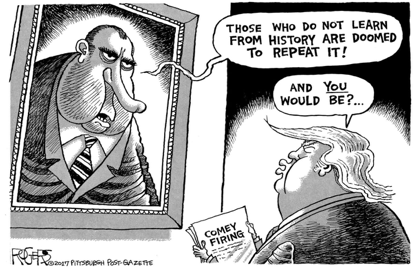CommentsYES, RUSSIAGATE-I’ve been reading lots of words comparing Trump’s situation to Richard Nixon’s. Some pundits say the most recent iteration of presidential campaign scandal and what happened 45 years ago is more or less identical. And some claim one is very much unlike the other.
Recently, I read Blind Ambition, authored by John Dean, one of the architects of the Watergate cover-up. Written more than 40 years ago, his confessional details what happened in the aftermath of the “third-rate burglary” that set things in motion. As White House counsel, Dean was at the center of the conspiracy. It began with lower level staff coming to him with legal questions. Eventually, he was meeting regularly with Nixon and his top aides, Bob Haldeman and John Erlichman.
What’s compelling about this story is not its recounting of the mechanics of cover-up -- payoffs to keep the accused from fingering others or attempts to find a scapegoat to satisfy prosecutors. The thing that fascinates is the attitude of the participants. The highest-ranking people in the government, including the president, who believed the law couldn’t -- or wouldn’t -- touch them.
They created secret units paid for by private donors to gather information on political opponents, going so far as to commit burglary and establish illegal wiretaps. They ordered the Internal Revenue Service to go after those they didn’t like. There was even an “enemies list” of anti-Nixon personalities (including Paul Newman.)
Things got real with the appointment of a special prosecutor and Congressional investigations of the 1972 campaign. Once they realized America’s legal system was beyond their absolute control, Nixon and his henchmen reacted like all other criminals.
Throughout Dean’s book, he describes meetings with Nixon, Haldeman, and Erlichman where they engaged in a not-so-subtle game of legal musical chairs. At the same time they were working to close out the investigation, each was seeking to cover his individual posterior.
This is the best comparison to what is likely happening now in Trump’s White House. What we see and hear from media is nowhere close to the full story. We know many of the players -- Trump, of course, and Jared Kushner and Michael Flynn and so on. What we don’t know is where Robert Mueller’s investigation will lead and who else will end up in the spotlight. (At one point, John Dean and his lawyer made a list of White House and Nixon campaign staff who were in danger of being indicted. The list contained 15 names.)
At this point, Trump and his cohorts are toughing it out, attacking the prosecutor, attacking the process, using social media to cry “witch hunt.” But, soon enough, some of them will be sitting in a deposition, before a Congressional committee or a grand jury, and they will be asked to raise their right hand and swear to tell the truth, the whole truth, and nothing but the truth.
Their choices are to refuse to answer, lie, or be honest. Or they can follow Attorney General Jeff Sessions route and say, “I can’t recall.” That doesn’t actually work, especially if someone else was present and sings like the proverbial canary.
Refusing to answer (invoking one’s Fifth Amendment right against self-incrimination) may be canceled by a grant of immunity. Lying may result in a perjury charge and conviction. Telling the truth could also land one in prison (like it did John Dean.)
For all the bravado, Trump et al are worried. As you read the Russiagate stories, look for who has hired a lawyer. A year or two from now, you may understand why.
(Doug Epperhart is a publisher, a long-time neighborhood council activist and has served on the Board of Neighborhood Commissioners. He is a contributor to CityWatch and can be reached at: [email protected]) Prepped for CityWatch by Linda Abrams.
-cw









